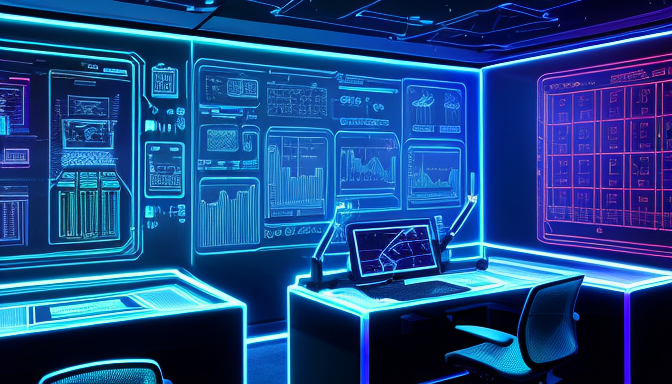In today’s fast-paced world, staying ahead of the curve is not just an option; it’s a necessity. The latest innovations in mobile technology, gadgets, and smart devices are not just reshaping our daily lives but also revolutionizing entire industries. Imagine a world where your smartphone can diagnose health issues or where your refrigerator can order groceries automatically. Sounds like science fiction? Well, it’s happening right now!
One of the most exciting trends is the rise of smart devices that communicate with each other, creating a seamless ecosystem. This interconnectedness is often referred to as the Internet of Things (IoT). For instance, consider how your wearable fitness tracker can sync with your smartphone to provide real-time health analytics. This kind of technology not only enhances personal wellness but also opens up new avenues for businesses to engage with customers.
Moreover, breakthrough technologies like augmented reality (AR) and virtual reality (VR) are making waves in sectors such as education and entertainment. They offer immersive experiences that can transform how we learn and play. Innovators should pay close attention to these trends, as they hold the potential to create unprecedented opportunities for growth and engagement.
In summary, whether it’s through the lens of mobile advancements or the integration of smart gadgets, the tech landscape is evolving rapidly. As an innovator, embracing these changes is essential to not only survive but thrive in the competitive market. So, what are you waiting for? Dive into these trends and be part of the future!
Artificial Intelligence and Machine Learning
Artificial Intelligence (AI) and Machine Learning (ML) are not just buzzwords; they are the driving forces behind a technological revolution that is reshaping our world. Imagine a world where machines can learn from data, adapt to new information, and make decisions faster than any human could. That’s the power of AI and ML! These technologies are enhancing efficiency and decision-making across various sectors, making them indispensable in today’s fast-paced environment.
In the healthcare industry, for instance, AI algorithms are analyzing patient data to predict health outcomes, allowing doctors to provide personalized treatment plans. Similarly, in finance, machine learning models are detecting fraudulent activities in real-time, safeguarding millions of transactions every day. The implications are enormous, and the potential for innovation is limitless.
But how do these technologies work? At their core, they rely on complex algorithms and vast amounts of data. Here’s a quick breakdown:
- Data Collection: Gathering relevant information from various sources.
- Data Processing: Cleaning and organizing the data for analysis.
- Model Training: Using algorithms to teach machines how to recognize patterns.
- Deployment: Implementing the trained model in real-world applications.
As we look ahead, it’s clear that AI and ML will continue to evolve, driving innovation in mobile technology, smart devices, and beyond. For innovators, staying informed about these advancements is not just beneficial; it’s essential for thriving in a competitive landscape. Are you ready to embrace the future?

Blockchain and Decentralized Technologies
Blockchain technology has emerged as a game-changer in the digital landscape, fundamentally altering how we perceive data security and transparency. Imagine a world where every transaction is recorded in a tamper-proof ledger, accessible to all but alterable by none. That’s the magic of blockchain! This innovation is not just a buzzword; it’s reshaping industries from finance to supply chain management, creating a trustless environment where parties can engage without the need for a central authority.
At its core, blockchain operates on a network of computers, or nodes, that work together to validate transactions. This decentralized nature means that no single entity has control, reducing the risk of fraud and enhancing security. In sectors like healthcare, blockchain can securely store patient records, ensuring that data is both accessible and protected. Similarly, in finance, it enables faster and cheaper cross-border payments, revolutionizing how we handle money.
Furthermore, the rise of smart contracts—self-executing contracts with the terms of the agreement directly written into code—highlights the potential of blockchain to automate and streamline processes. These contracts can drastically reduce the need for intermediaries, saving time and costs. For instance, in real estate, smart contracts can facilitate property transfers without the traditional headaches of paperwork and legal fees.
As we dive deeper into the world of blockchain, it’s essential to keep an eye on emerging trends, such as:
- Decentralized Finance (DeFi)
- Non-Fungible Tokens (NFTs)
- Supply Chain Transparency
In conclusion, embracing blockchain and decentralized technologies is not just about keeping up with trends; it’s about positioning yourself as a leader in an ever-evolving digital world. The future is here, and it’s decentralized!
Frequently Asked Questions
- What are the key benefits of using Artificial Intelligence in business?
Artificial Intelligence (AI) can significantly enhance efficiency by automating repetitive tasks, allowing teams to focus on more strategic activities. It also improves decision-making through data analysis, providing insights that humans might overlook. Imagine having a super-smart assistant who never sleeps!
- How does Blockchain technology ensure data security?
Blockchain technology offers enhanced security by creating a decentralized ledger that is nearly impossible to alter. Each transaction is encrypted and linked to the previous one, making it a robust system against fraud. Think of it as a digital fortress where every entry is locked tight!
- Can small businesses benefit from Machine Learning?
Absolutely! Small businesses can leverage Machine Learning to analyze customer data, predict trends, and personalize marketing efforts, all of which can lead to increased sales and customer satisfaction. It’s like having a crystal ball that helps you make smarter choices!
- What industries are most affected by these tech trends?
Industries such as healthcare, finance, and supply chain management are experiencing significant transformations due to these technologies. They’re finding innovative ways to improve operations, enhance security, and better serve their customers.
